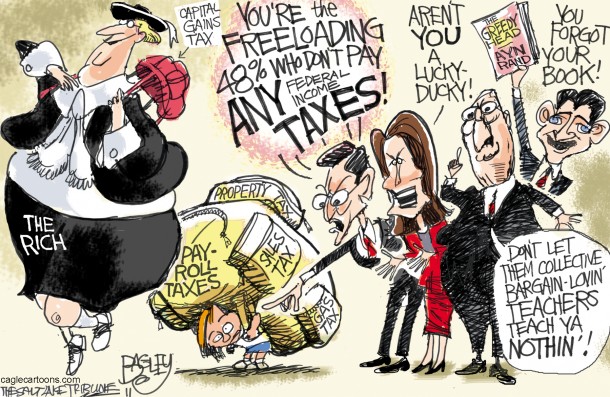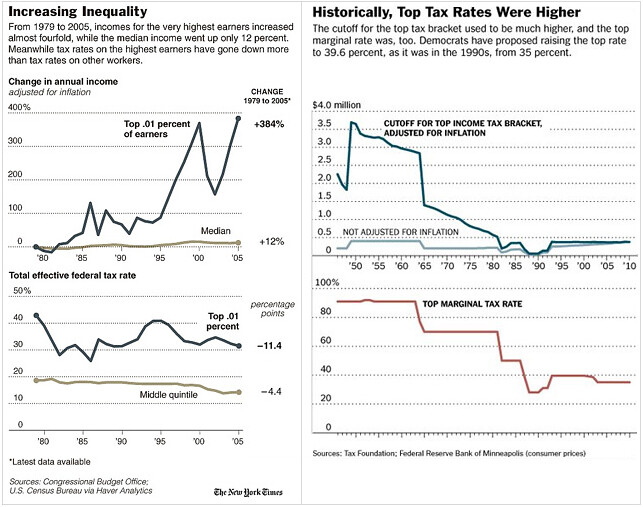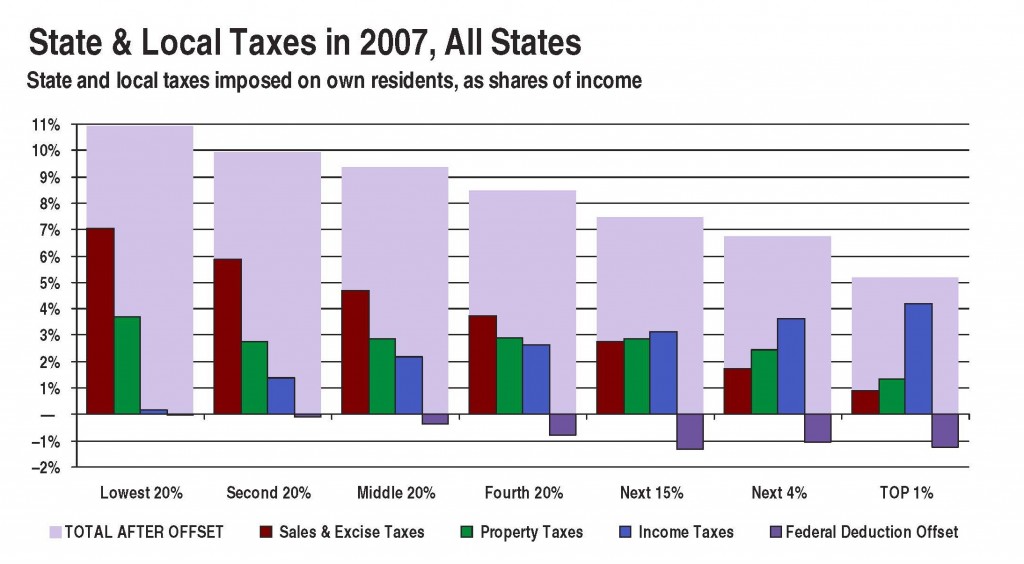
Taxes have become one of the defining issues in the partisan divide that plagues our politics and has paralyzed our government. The loudest voices on the political Right make a number of arguments which are summarized below:
1) Taxes are too high, are evil, and reduce productivity in the private sector.
2) Taxing the rich is bad because they are the most productive members of society. A progressive tax system is thus unfair and amounts to redistribution.
3) The rich pay more than their share of taxes while many Americans don’t pay taxes.
4) The private sector is more efficient than government and should be relied upon to provide societal services currently provided by the government (this last point will be addressed at length in another post about economic theory and market failure).
These arguments are the foundation of decades of conservative economic thought and policy and are the rallying cry behind the conservative Tea Party movement and to a great extent the Republican Party. In this article, I seek to discuss and counter these Conservative arguments and to make the case for higher taxes, particularly on higher income earners (government spending is a closely related issue that will be addressed in a separate blog post).
Progressive Taxation and the New Social Contract
For close to 100 years, the United States has operated under the tenants of a Social Contract between the government and its citizens. The New Social Contract works as follows: Work hard and you’ll make a living. Invest in your self and take entrepreneurial risk and you have a shot at historically epic prosperity. Courts will enforce your contracts, patents, and property rights. The government will defend your safety and property. Investment in research will facilitate innovation and entrepreneurship. Reliable and safe roads and infrastructure will to deliver your products and services to market. Schools and universities will ensure that you have access to great education, will have quality workers to hire, and cutting edge science to commercialize. And if you fail, there will be a net to catch you. Pay taxes and the government will make sure the New Social Contract is fulfilled and will step in where the market fails (the concept of “market failure” is a very specific economic principle discussed in detail here).
The New Social Contract is the reason why the government invests in national defense, education, research and development, environmental quality, public health, and national security – all areas where markets fail. The New Social Contract is the reason why we can take entrepreneurial risk without fear of starving in the streets if we fail. The New Social Contract is why we have a middle class. The New Social Contract is the reason why we have progressive taxation.
Progressive taxation supports the principle that there is no economic gain without civilization. The moral extension of that concept is that greater the economic gain one achieves from civilization, the greater his or her duty to maintain that civilization. In other words, it is both reasonable and morally right for those who benefit most from our society, those who prosper the greatest under the New Social Contract, to pay more into the system that made their prosperity possible. Even Adam Smith, father of free market capitalism, said of progressive taxation:
“It is not very unreasonable that the rich should contribute to the public expense, not only in proportion to their revenue, but something more than in that proportion.”
Progressive taxation is important to the preservation of the American Social Contract and provides the context for the progressive argument in the debate about taxation.
Watch Warren Buffet and Bill Gates discuss the issue of progressive taxation:
Tax cuts for the rich do not boost economic growth
A basic tenant of conservative economic philosophy states that taxes hurt economic activity. And, while it is true that, for example, a tax rate of 100% would obviously impede almost all economic activity, it is far less clear where the line should be drawn. Conservative dogma has long been that whatever rates we have today, regardless of historical rates, are too high. Further, Conservatives argue that, as the most productive members of society, taxing the rich has a disproportionate negative impact on economic activity. Yet there is ample evidence to the contrary.
A 2012 study by the non-partisan Congressional Research Service examined 65 years of economic data and concluded that there is no inverse relationship between tax rates at the top (both income and capital gains) and economic growth.
The following graph shows the lack of correlation between historic capital gains rates and economic activity:
Reducing top tax rates increase income inequality and balloon the deficit
The main effect of cutting top tax rates has been to make the rich much richer. While reducing tax rates at the top has not resulted in economic growth, it has resulted in increased income inequality and more national debt. The following graphs show income inequality over time next to top tax rates over time. Tax rates for the rich have come down dramatically over the last 60 years. Over the last 30 years, medium household income has remained fairly stagnant, while income at the top has jumped dramatically.
Along with lower top tax rates and increased income inequality has come a ballooning of the US debt. The graph below is based on Congressional Budget Office forecasts of the deficit and shows the main contributors to the budget deficit through 2019. The single largest contributor to the deficit has been the Bush tax cuts, the majority of which went to the rich.
In defending the Bush tax cuts, Conservatives often make two false claims: that the Bush tax cuts created jobs and economic activity, and that the Bush tax cuts actually increased government revenue. In fact, real GDP growth after the Bush tax cuts peaked in 2004 at 3.6% and declined steadily afterwards. Likewise, tax revenue did not increase when adjusted for GDP growth. Economist Bruce Bartlett, who advised both Presidents Reagan and George H.W. Bush, wrote an excellent article about this that you can find here.
Between 1960 and 2008, total tax revenue as a % of GDP has remained between 15 and 20%. While there are numerous variables that influence these numbers, you will notice in the graph below that the higher Clinton tax rates in the 90s coincided with consistent increasing government revenue as a % of GDP, while the lower Bush rates did not.

Are the rich more productive?
Proponents of tax cuts for the rich often argue that the wealthy are the most productive members of society and that taxing them thus hurts economic growth. This is not borne out by evidence. Many of the highest earning individuals in the U.S. (like Mitt Romney) earn most or all of their earnings from capital gains from investments (money made from money), doing little to create economic growth yet enjoying very low tax rates. As discussed above, cutting taxes for the wealthy has not been shown to create economic growth.
While having a high income is not an accurate proxy for being economically productive, one could argue that being a business is a good proxy for economic productivity (I generally agree with this concept). Investment and hiring decisions are made on a business level, and targeted tax cuts for businesses would, very generally speaking, help incent investment and hiring, even if the high-end income tax rates and capital gains tax rates for investors in those same businesses were relatively higher once income is distributed to those investors. Tax cuts for small businesses and targeted business tax cuts can help incentivize investment and hiring while maintaining progressive rates for owners of those businesses preserves the progressivity required to preserve the New Social Contract.
Small businesses are not in top tax brackets
According to the Census Bureau, in 2008, 50% of all jobs, representing nearly 60 million employees, were in companies with fewer than 500 employees. These small businesses are often used as political footballs the debate about tax rates, with claims that tax increases on the rich negatively impact small businesses. A common conservative refrain has been to claim that many small businesses pay taxes as individuals, that increasing taxes on high earners thus means increasing taxes on small businesses, and that 50% of small business income would be subject to tax increases on income over $250,000 per year. But do progressive tax rates hurt these businesses?
According to the non-partisan Tax Policy Center, only 2% of small businesses are in the top two income brackets that would be impacted by a tax increase on income over $250,000 per year. According to the Joint Committee on Taxation, such a tax increase would impact 3% of all businesses.
It is also important to note that, in making these false claims, Conservatives have used a selective definition of small business that includes some of the largest and richest corporations in the world, including many hedge funds, law firms, and corporate giants like Bechtel, Price Waterhouse Coopers, and even the infamous Koch Industries, which has over 70,000 employees. By including these large companies in their definition of small business, Conservatives have misleadingly argued that increasing taxes on the rich hurts small businesses.
The Center on Budget and Policy Priorities have written an excellent report on this issue, which can be found here.
All Americans pay taxes
Jon Stewart on taxes and deficit reduction
Conservative dogma states that a large portion of Americans pay no Federal taxes (Presidential candidate Mitt Romney famously stated that 47% of Americans pay no income taxes and are dependent on the government). These people, the argument continues, have no “skin in the game” and benefit from entitlements largely funded by the rich in what they disdainfully refer to as “redistribution”.
I have discussed above how a progressive tax system is a fundamental tenant of the New Social Contract and responsible for helping create the society that makes unprecedented wealth and prosperity possible. But is it true that half of Americans don’t have skin in the game?
While some Americans, like senior citizens, the working poor, and disabled veterans, pay no federal income taxes, all Americans pay some taxes. The table below breaks down the effective total tax rates paid by people in various income brackets:
While those with the highest income typically pay more in federal income taxes, the poorest Americans pay a whopping 17.4% of their income in taxes, ranging from Federal payroll taxes state, local, and state taxes. This rate is lower than many of the wealthiest Americans and corporations pay, thanks to a host of tax loopholes, deductions, and preferential treatment received by everything from carried interest deductions for hedge fund managers to low capital gains tax rates.
State, local, payroll, and sales taxes are regressive
While high income earners pay a higher Federal income tax rate, State, local, payroll, and sales taxes are regressive, disproportionately hitting the poor and lower middle class. That is partly because lower income Americans use a larger percentage of their income to buy necessary goods like food, gas, and pay property taxes. Also, many high income earners earn income from investments, not work, and they pay no payroll tax on that income.
The above table is from “Who Pays? A Distributional Analysis of the Tax System in All 50 States“, a report issued by the Institute on Taxation and Economic Policy. As the report indicates, those in the lowest 20% income bracket pay a significantly higher portion of their income in sales, excise, and property taxes than those in higher income brackets.
(Note: The fact that lower income earners spend a much higher percentage of their income on necessary goods like food and fuel calls into question the wisdom of “trickle down” economics. If the poor spend most or all of their money immediately, a “ground up” progressive tax policy would result in that money flowing through the economy and into the same companies owned and managed by the wealthy. The difference between “trickle down” and “ground up” is that the progressive tax policy ensures that the standard of living of the poor increases as those dollars flow into the economy.)
The Case for a More Progressive Tax System
For the last 30 years, America has undertaken a conservative economic experiment: We have slashed taxes for the rich from a top rate of 70% when Reagan was elected to 35% when George W. Bush left office. The promise of these policies has been economic growth that creates a rising tide that would “lift all boats”. The cost has been massive deficits, huge and growing income inequality, and no positive impact on economic growth. American productivity has increased steadily for the last 30+ years, and thanks to historically low tax rates for the rich, almost all of the benefit from that productivity has gone to the richest Americans.
The distinction between investment and spending seems to be lost in today’s conservative ideology. Thanks to decades of tax cuts, a flattening of the tax code, and under-investment, America is in decline, from schools, bridges, and roads, to health care and technology. Without a willingness to invest in America on the same grand scale that previous generations were willing to undertake, our greatest days seem behind us. And so long as Conservatives view all taxes as bad, today’s historically low tax rates as too high, and progressive taxation as unfair, America will not be set on the road towards prosperity.
The New Social Contract and a progressive tax system is the reason we have had and in many ways still have one of the most prosperous societies in history. Without it we would have an even bigger disparity between rich and poor, people starving in the streets, no middle class, generations of aristocratic families, high crime rates, poorer schools, and a society in decline. Progressive taxation has supported stability and prosperity because of, while wealth is created with drive and ingenuity, it is not created in a vacuum. We are beneficiaries of generations before us that laid the groundwork for our success by investing in research & development, roads and infrastructure, education and universities, the legal system that supports our contracts, and the financial system that makes capital available to our companies. It is time for our generation to rise to the challenge, peel back the decades of failed conservative tax policy and misinformation, and to make the investments that will be required for another 100 years of American leadership and prosperity.








